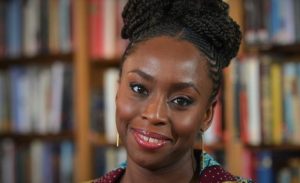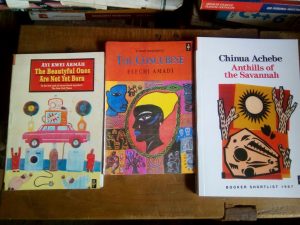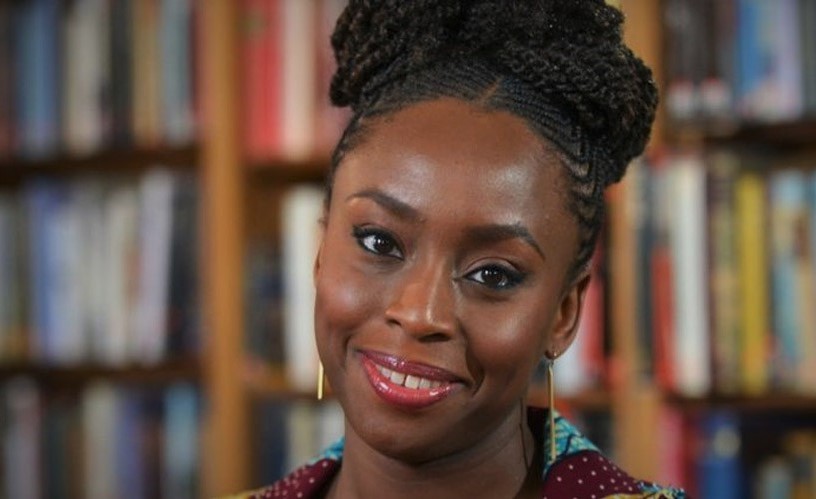
@ikhide: Interesting how Western liberals react with outrage and condescension whenever an African thinker departs from liberal orthodoxy and tries to think for him or herself; witness the troubles Adichie and Ngugi have been in for daring to have independent views on contemporary issues.
The above tweet which I came across this morning got me thinking. Is it that Western liberals who by the way often lay claim to championing globalisation and equality believe it must be achieved on their own terms? or that Africans are unwilling to take a stand and grab the bull by its horns to emancipate ourselves from the shackles of the slave mentality?
At the Night of ideas event which held at the prestigious Quai d’Orsay Paris, home of the Foreign Ministry, a French journalist had asked our globally acclaimed Chimamanda if Nigeria has bookstores. A question which did not go down well with the award-winning author and outspoken feminist. In a typical manner, her response was predictable “I think it reflects very poorly on French people that you have to ask me that question,” she quipped.
Whether Caroline Broué was ignorant or just being mischievous is anyone’s guess, but that has taken the backstage. The discourse elicited by the uncanny exchange is now centred on racism and colonial prejudices. Expectedly many Nigerians took to the social media to hurl expletives at the lady, she was labelled arrogant, insolent, ignorant and of course racist.
For me, however, the issue presents an opportunity for us to critically interrogate the dwindling reading culture which by extrapolation is responsible for the falling standard of education we have in our society currently. Not long ago I discussed a tweet about Nigeria’s unemployment problems on my facebook wall. Agreed we have unemployment problem which appears to be well known, but we have even a bigger problem of unemployability because of the low educational standards. Can we honestly put side by side many of today’s graduates with those of the 70s and 80s? of course not.
Growing up as secondary school students in the coal city, we were always excited to visit Prince Bookshops opposite UNEC gate or the National Library both of which were walking distances from CIC. Memories of Marvel, Tiger and Speed, Western Comics remain evergreen just like the hardcover series of The Hunchback of Notre Dame, Dr Jekyll and Mr Hyde and many others endure. A common phrase from one of my extramural class teachers back then was that “exceptional intellectuals are usually products of libraries”. That line ultimately resulted in the acquisition of novels as bragging rights and has never departed my consciousness in the quest for more knowledge till date.
Today our national libraries spread across the country are in such deplorable state that many are hardly recognisable. Whatsmore, besides the silly excuse of convoluted bureaucracy, a larger portion of the meagre funds for these libraries when eventually released often end up in the pockets of those in charge. I can vividly recollect watching the protest staged by the Workers of the National Library of Nigeria last October. They ‘ve obviously had enough of the stalling and poor financial allocation to a project which commenced close to 20 years ago. Who would have believed that our National Library in Abuja is still on a rented property? What a shame!
How did we get here one is often forced to ask. It is partly because successive governments have failed to meet the UN recommended budgetary allocation for bridging the educational funding gap in developing countries. With a Minister of Education who publicly claimed to have inquired about the ‘much-touted’ 26% budgetary benchmark on education from UNESCO and discovered it was false, one can rightly say that the danger signal is definitely lost on this government. Mr Adamu did not deem it wise to state the figure he got from his ignominious inquiry but rather chose to defend the 7% allocation which was far below the actual UN figure of 15-20%.
The problem is also worsened by a populace that continues to relegate the importance of a reading culture that once motivated top-notch authors like Achebe and publishers like Macmillan. These two gave us Things Fall Apart and the unforgettable collection of pacesetter novels respectively. The focus nowadays is on getting a certificate by any possible means. Most students are willing to do just about anything to pass their exams. Unfortunately, many parents across the nation largely support this oddity.

At the University of Cardiff, the library was where you spent the most time after classes. It is an integral part of your life as a student. I recollect that back in the 80s freshmen in Nigerian universities normally go through an induction process where they are acquainted with the library and the discipline that comes with it. I doubt the number of our universities that still practice it now. That perhaps explains my surprise when I met an undergraduate of Nnamdi Azikiwe University buying a lot of old African novels in a bookstore at the temporary site. From our little chit-chat, I gathered that she was studying English which typically required a lot of reading. However, it was gladdening to learn that having come from a background where reading is a habit, some of the books were not recommended coursework but just for her reading pleasure.
Of course, there is a global decline in the reading culture. All thanks to the digital technology age we find ourselves in, but what are we doing as a nation to curb the trend? The only public Library in Awka South Local Government located in Amawbia is derelict whereas there are libraries spread across the counties (the equivalent of LGAs) in Ireland. For instance, Cork City with a population of just over a hundred thousand people has at least 7 public libraries and many other private ones. The bookstores? Oh, there are hundreds of them at the city centre excluding the online ones.
It is also sad that our environment is generally not conducive to reading, this includes the institutions of higher learning. What with buses and Keke NAPEP honking across the Unizik library whereas libraries over here are strictly tagged as quiet zones. The tranquillity, stable power supply and accessible services make reading a lot more enjoyable in saner climes. I try to imagine reading a novel while seated on a Chisco bus to Lagos, something I often look forward to on any bus/train ride over here.
The fact that this topic has been flogged ad nauseam with little action is manifest in the rate of failure recorded by students in the WAEC, NECO and other examinations of the recent past. And to think that some of us plan to send down our kids to study partly in Nigeria for obvious reasons makes it overly worrisome.
To reverse this ugly trend requires concerted efforts from all of us. Parents must appreciate more their crucial role as the first level of contact with the children because many parents rarely spend time with their children to groom them academically nowadays. The requisite foundational orientation is often lacking and in some cases, delegated to house-helps who may not even be literate enough to undertake such tasks. I just got an invitation from my son’s school to attend a family clinic for teenagers. It will be a 2-hour fortnightly event that will have counsellors advising parents and wards on improving their relationship. Such event should be included in our school curriculum with more emphasis on enhancing our children’s reading habits.
Greater attention should also be paid to the type of programmes aired on our broadcast media. That we have more of religious and entertainment than educational programmes on the airwaves is an indication of a doleful future. Don’t get me wrong because I do understand that we all have our choices which should be respected but it behoves a developing nation like ours to reduce entertainment shows that often distract the masses from things that really matter and promote educational programmes that will impact meaningfully on the society.
Lastly, local content should be encouraged in every way. Reading is reading irrespective of the language used. Therefore, books written in Nigerian languages can become more useful instruments as formidable stores for our national memory and crucibles for cultural preservation going into the future. As we await the federal government’s declaration of emergency on education in April, it is hoped that the ministries concerned will allocate the much-needed funds to rehabilitate our libraries nationwide and facilitate programmes that will improve our waning reading culture.






